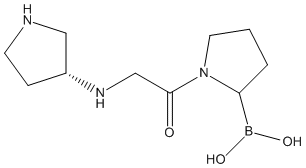Dutogliptin
Dutogliptin is a potent, water soluble, selective and orally bioavailable, boronic acid-based inhibitor of dipeptidyl peptidase 4 (DPP-4), with hypoglycemic activity. Dutogliptin irriversibly binds to DPP-4. Studies with dutogliptin, have been terminated
General
Type : Drug,Pyrrolidine,Gliptin,Boron compound
Chemical_Nomenclature : [(2R)-1-[2-[[(3R)-pyrrolidin-3-yl]amino]acetyl]pyrrolidin-2-yl]boronic acid
Canonical SMILES : B(C1CCCN1C(=O)CNC2CCNC2)(O)O
InChI : InChI=1S\/C10H20BN3O3\/c15-10(7-13-8-3-4-12-6-8)14-5-1-2-9(14)11(16)17\/h8-9,12-13,16-17H,1-7H2\/t8-,9+\/m1\/s1
InChIKey : DVJAMEIQRSHVKC-BDAKNGLRSA-N
Other name(s) : UNII-38EAO245ZX,PHX1149,[(2R)-1-[[(3R)-3-pyrrolidinylamino]acetyl]-2-pyrrolidinyl]-boronic acid,[(2R)-1-(2-{[(3R)-pyrrolidin-3-yl]amino}acetyl)pyrrolidin-2-yl]boronic acid
MW : 241.09
Formula : C10H20BN3O3
CAS_number : 852329-66-9
PubChem : 11253490
UniChem : DVJAMEIQRSHVKC-BDAKNGLRSA-N
IUPHAR :
Wikipedia :

Target
Families : Dutogliptin ligand of proteins in family: DPP4N_Peptidase_S9
Stucture :
Protein : human-DPP4
References (2)
| Title : Dutogliptin, a dipeptidyl peptidase-4 inhibitor for the treatment of type 2 diabetes mellitus - Johnson_2010_Curr.Opin.Investig.Drugs_11_455 |
| Author(s) : Johnson KM |
| Ref : Curr Opin Investig Drugs , 11 :455 , 2010 |
| Abstract : Johnson_2010_Curr.Opin.Investig.Drugs_11_455 |
| ESTHER : Johnson_2010_Curr.Opin.Investig.Drugs_11_455 |
| PubMedSearch : Johnson_2010_Curr.Opin.Investig.Drugs_11_455 |
| PubMedID: 20336594 |
| Title : Dutogliptin, a selective DPP4 inhibitor, improves glycaemic control in patients with type 2 diabetes: a 12-week, double-blind, randomized, placebo-controlled, multicentre trial - Pattzi_2010_Diabetes.Obes.Metab_12_348 |
| Author(s) : Pattzi HM , Pitale S , Alpizar M , Bennett C , O'Farrell AM , Li J , Cherrington JM , Guler HP |
| Ref : Diabetes Obes Metab , 12 :348 , 2010 |
| Abstract : Pattzi_2010_Diabetes.Obes.Metab_12_348 |
| ESTHER : Pattzi_2010_Diabetes.Obes.Metab_12_348 |
| PubMedSearch : Pattzi_2010_Diabetes.Obes.Metab_12_348 |
| PubMedID: 20380656 |